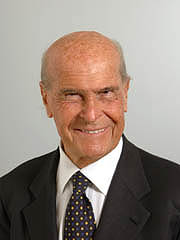Umberto Veronesi
[3][nb 3] Given the early death of his father, the maternal figure of Erminia Verganti, to whom he dedicated the book Dell'amore e del dolore delle donne, was fundamental for him.
[11][12][13] After spending brief periods in England and France,[10] Veronesi joined the Italian Cancer Institute in Milan as a volunteer, and in 1975 became its director.
[22][23] In June 2005, 1,800 surgeons called for Veronesi to be awarded a Nobel Prize for having revolutionised cancer treatment.
[24] Veronesi, who was chairman of the BioGeM Scientific Committee and also a member of the boards of directors of Mondadori,[nb 5] supported and promoted scientific research aimed at improving conservative surgical techniques, including sentinel lymph node biopsy, which resulted in axillary dissection in breast cancer with clinically negative lymph nodes no longer being performed.
[29][nb 6] In 2012, some Italian websites reported that the institute led by Veronesi had purportedly certified the effectiveness of the Di Bella method, which he had already dismissed as part of the 1998 parliamentary commission and again in 2005;[nb 7] the news proved to be a hoax and Veronesi described it as fake news and confirmed the ineffectiveness of the Di Bella method.
[11][13] His opposition to what he described as "the unjustified bogeyman" of nuclear power and his support for the usefulness and harmlessness of incineration earned him criticism from Beppe Grillo.
[11][13][nb 10] For the 2012 Italian centre-left primary election, he said that he was inclined to vote for the left-wing candidate Nichi Vendola of Left Ecology Freedom (SEL).
[11][13] In the 2016 Milan municipal election, he expressed his support for the centre-left coalition candidate and eventual winner Giuseppe Sala.
[11][13] Veronesi was married to Sultana Susanna "Susy" Razon, a pediatrician of Jewish faith and Turkish origins who had survived the Nazi concentration camps.
[44] Together, they had seven children (five boys and two girls), two of whom, Paolo and Giulia, followed in his footsteps and are surgeons, while a third, Alberto Veronesi, is an orchestra director.
[10][13][nb 11] The secular funeral took place at Palazzo Marino in the presence of Sala and many ordinary people; his son Alberto honoured him with two musical pieces by Ludwig van Beethoven and Giacomo Puccini.
[45] Among the various campaigns promoted by Veronesi was that in 1995 for the decriminalisation and regulation of soft drugs and hemp derivates, especially for its therapeutic uses in the field of pain therapy.
[46][nb 12] He was part of the guarantors of the Liberta e Giustizia association, which acts in defense of the secular state and the balance between powers.
In March 2005, on the occasion of a conference on environmental communication, Veronesi mentioned the toxins contained in certain foods, for example polenta, potatoes, flour, or basil.
[11][13] On 11 December 2006, on the occasion of the awarding of the honorary degree in Agricultural Sciences and Technologies at the University of Naples Federico II, Veronesi reiterated that "genetic engineering is not a magic wand for solving the problems of humanity, but it is an extremely intelligent method to fight world hunger, to reduce the impact of pesticides, to combat desertification.
[10][nb 13] The aim was to address the root causes of conflicts and inequalities with a scientific approach and propose concrete solutions to overcome them.
So we are fighting for peace in the world, against wars, against weapons, against abuses of power, against violence, against the death penalty, in favour of women whose identity is trampled upon in many countries.
"[54] Over the years, Veronesi publicly expressed his views on several ethical and bioethical issues in interviews, televised debates, and his books,[11][13] and was known for his support of civil rights.
[59] Veronesi supported active euthanasia, affirming the right of any individual to end their life if it became unbearable due to suffering or loss of dignity.
[73] In his opinion, women would be more resistant to pain and fatigue, more loyal to the company or institution they represent, less aggressive, more decisive, and more devoted to harmony, peace, and civil progress.
[90] Veronesi supported GMOs as a way to produce food with higher nutritional capabilities and deprived of potentially carcinogenic substances.
In a 2006 statement, he further underlined how GMOs can be used to fight world hunger, reduce the impact of pesticides, and combat desertification.
[97][nb 25] In 2014, Veronesi won the inaugural Vespasiano Gonzaga National Golden Fleece Award, which is intended for those who "exceptionally honoured society without limits of age, nationality, sex, rank, profession and political or religious affiliation",[nb 26] for "the extraordinary scientific contributions provided to oncology research, prevention, diagnosis and treatment of tumors".




